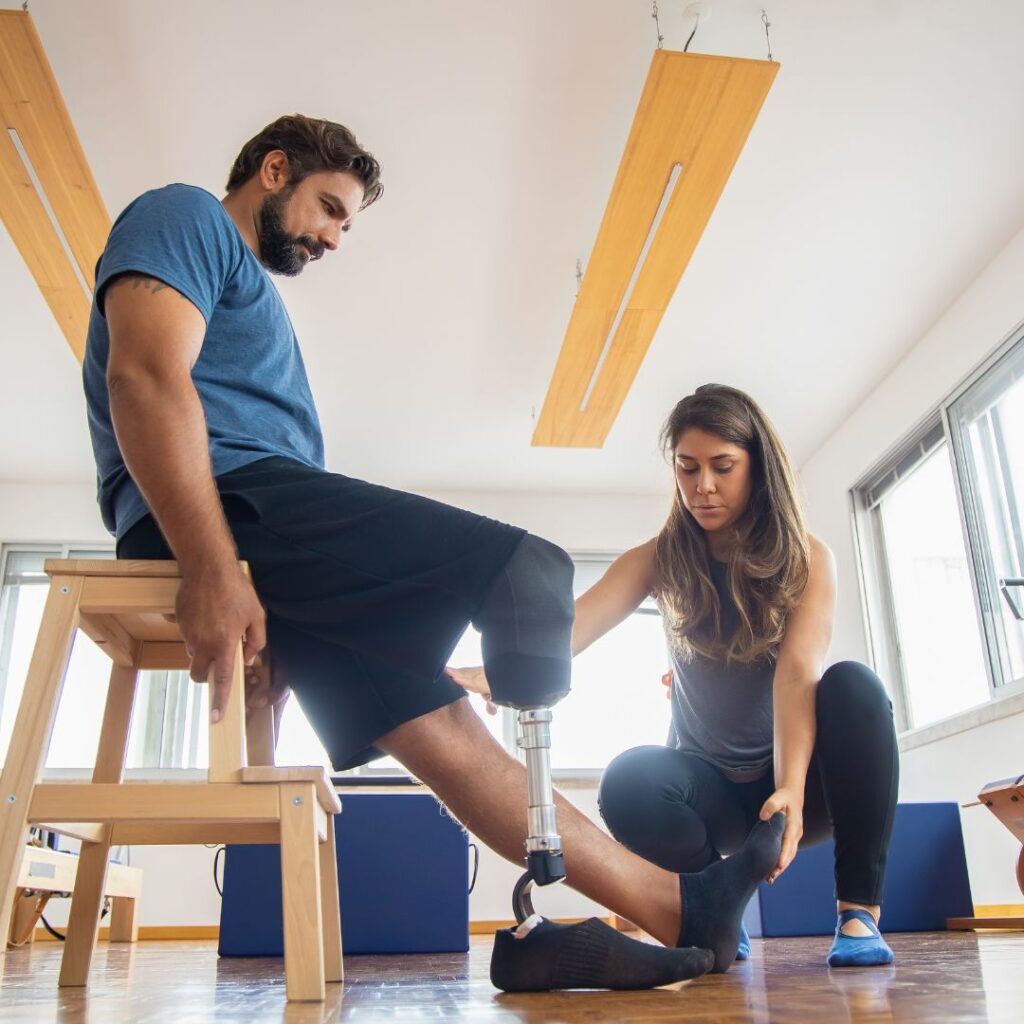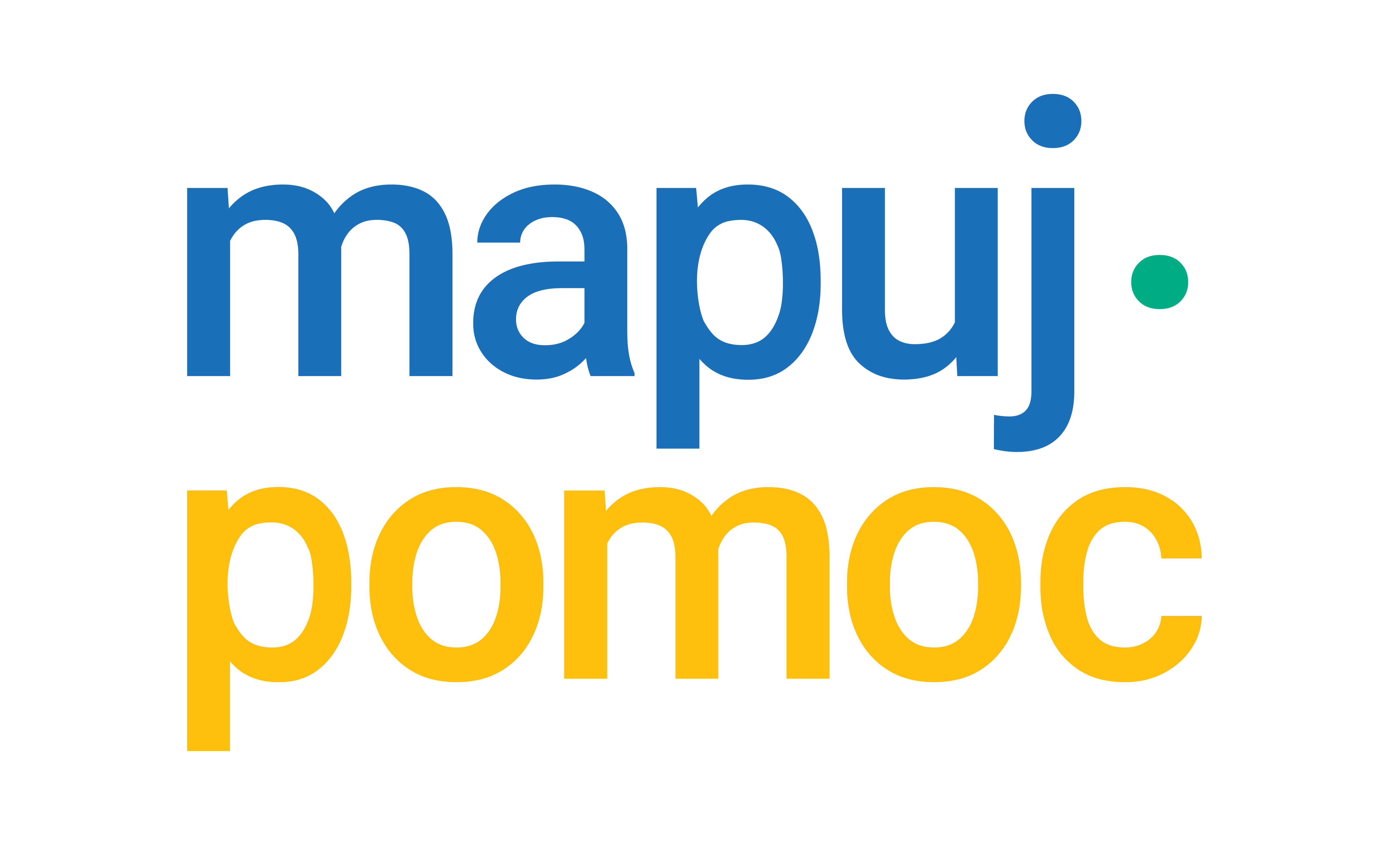From this article, you will learn how refugee individuals with disabilities can apply for free rehabilitation in Poland. We describe the criteria that qualify for rehabilitation within the Polish healthcare system and the details of the treatment process in our country. We also suggest what information is available regarding which non-governmental organizations provide assistance and to what extent they help refugees with disabilities.

Who is eligible for rehabilitation in Poland?
Thanks to the Act of March 12, 2022, on assistance to Ukrainian citizens, individuals from Ukraine who crossed the border after February 24, 2022, are entitled to medical care. They receive benefits in a similar scope as people from Poland. The exceptions are spa treatment and spa rehabilitation. [1]
Importantly, to be eligible for benefits, one does not necessarily have to have Ukrainian citizenship. The care also covers:
- Spouses of Ukrainians who do not have Ukrainian citizenship but arrived in Poland after February 24, 2022,
- Ukrainian citizens with a ‘Karta Polaka’ (Polish Charter/Card),
- Immediate family members of a Ukrainian citizen with a ‘Karta Polaka’ who arrived in Poland after February 24, 2022.
Jak działa rehabilitacja w polskim systemie ochrony zdrowia?
Świadczenia medyczne dla osób z Ukrainy są finansowane w taki sam sposób jak dla obywateli Polski. To oznacza, że opłacane są z budżetu państwa za pośrednictwem Narodowego Funduszu Zdrowia (NFZ).
See more: How does the National Health Fund (NFZ) work? Public healthcare for refugees from Ukraine
Under the NFZ, patients can expect rehabilitation in outpatient, home-based, inpatient, or day center settings. [2] To undergo rehabilitation, a referral from a doctor affiliated with the NFZ is required. The referring doctor chooses which form of treatment is appropriate for a particular patient. [3]
The duration and number of treatments funded by the National Health Fund (NFZ) depend on the form in which the rehabilitation is conducted.
- In outpatient conditions, up to 5 treatments per day are funded in a ten-day therapeutic cycle.
- In home conditions, the patient is entitled to rehabilitation for up to 80 treatment days in a calendar year. Up to 5 treatments can be performed per day.
- Rehabilitation in a center or day ward lasts from 15 to 30 treatment days, during which up to 5 treatments can be performed per day.
Outpatient rehabilitation and home-based rehabilitation

- For outpatient rehabilitation, which takes place in an appropriate clinic, any doctor with a contract with the NFZ (National Health Fund) can provide a referral. However, if the condition is more serious, a referral from a specialist doctor, such as in general rehabilitation, medical rehabilitation, orthopedic surgery, motor organ rehabilitation, or orthopedics and traumatology, will be required. For adults, the referral is valid for 30 days. This means that the patient must report to the rehabilitation center within this period. For children with central nervous system damage, treatments can be based on one referral throughout the year, provided by a specialist doctor.
- For home-based rehabilitation, one can be referred in cases where the patient is not mobile and cannot independently reach the clinic for outpatient rehabilitation. The NFZ (National Health Fund) has indicated that this primarily concerns people in a vegetative state or individuals with:
- focal brain injuries;
- severe injuries to the central and peripheral nervous system;
- spinal cord injuries;
- chronic diseases, such as: muscular atrophy, Parkinson’s disease, polymyositis, brain tumors, rheumatoid arthritis;
- degenerative joint diseases.
Rehabilitation in a day center and inpatient form
- Rehabilitation in a day center is available for individuals whose health condition prevents them from undergoing physiotherapy on an outpatient basis and who do not require round-the-clock medical care. Referrals for rehabilitation in such a mode are issued by specialist doctors dealing with the specific ailment. Day center treatments, for example, are applied for children up to 18 years of age with developmental age disorders. Rehabilitation sessions in such a center can also be directed for individuals aged 18 to 25 who have a determination for the need for special education or the need for revalidation and educational activities (concerning profound impairment). In the case of the youngest with developmental age disorders, a referral can be issued by primary health care doctors or specialists in neonatology, rehabilitation, orthopedics and traumatology of the musculoskeletal system, neurology, rheumatology, pediatric surgery, pediatric endocrinology, and pediatric diabetology.
- In the inpatient form, those who, due to the continuation of treatment, require comprehensive rehabilitation services and 24/7 medical and nursing supervision are rehabilitated. Inpatient rehabilitation is often carried out following a stroke, as well as immediately after injuries, surgeries, and amputations.
It’s worth noting that individuals with a certification of significant disability can access rehabilitation services outside of the waiting queue.
See also: Obtaining a Disability Ruling: How to Get It?
How to find a clinic or doctor who speaks Ukrainian or Russian?

In Poland, the issue of assisting patients who do not speak Polish has not been addressed so far. However, there are online search engines available that can help people from Ukraine find support in the appropriate language. These include:
medicalhelp.pl – The Polish Society of Family Medicine [Polskie Towarzystwo Medycyny Rodzinnej] has launched a search engine that allows users to find a medical facility where the staff speaks Ukrainian, Russian, or English.
lekarzedlaukrainy.pl – This platform is dedicated to all refugees who need medical advice. The specialists collaborating with it offer free in-person visits and teleconsultations.
The National Health Fund operates a helpline at the number 800 190 590. The helpline is available 24/7 and also provides information in Ukrainian. By calling this number, one can, among other things, find out where to locate an appropriate doctor.
Organizations providing assistance to refugees with disabilities
Apart from rehabilitation within the National Health Fund in Poland (NFZ), there are also foundations and non-governmental organizations that provide assistance in rehabilitation to people with disabilities, and in their activities, they also support refugees.
Association MUDITA – supports people with disabilities and, equally important, their families. The association primarily provides informational support, helping in:
- finding specialists (including doctors, therapists) from various fields, centers, and diagnostic, therapeutic, rehabilitation, or educational facilities,
- handling formalities related to obtaining disability assessments, benefits, and caregiving allowances; personal assistance programs, respite care, or SUO – specialized caregiving services and other entitlements for parents of a child with a disability as well as other caregivers and guardians of people with disabilities,
- seeking paid care for children and adults with disabilities,
- in other challenging and unusual matters related to caring for a child with a disability or another family member.
MUDITA also provides psychological and respite support to families caring for individuals with disabilities. Information can be obtained from Monday to Friday between 10:00 am and 4:00 pm at the phone number: +48 539 866 471, and at the email address: [email protected].
Read also: Stowarzyszenie Mudita o wsparciu informacyjnym i asystenturze dla uchodźców z niepełnosprawnościami
The “Life Full of Possibilities” Foundation [Fundacja Życie Pełne Możliwości] – based in Krakow, offers free assistance to anyone with disabilities arriving from Ukraine. The foundation helps individuals navigate the Polish healthcare system and also assists in obtaining financial support for rehabilitation equipment (such as wheelchairs, rehabilitation beds, and standing frames). Individuals can also approach the organization for assistance with the administrative procedures to obtain a disability degree certificate and can benefit from free medical consultations confirming the right to free rehabilitation equipment. On its website, “Life Full of Possibilities” has provided a number for Ukrainian speakers to call: +48 571 242 427.
The Employment Agency of the Fuga Mundi Foundation [Stowarzyszenie Centrum Rozwoju Edukacji Obywatelskiej CREO] – operates in Lublin, Kielce, Rzeszów, and Radom. The agency specializes in the activation and equalization of opportunities for people with disabilities. Last year, Fuga Mundi published a guide for people with disabilities who came from Ukraine and would like to work in Poland. You can find it here.
The Employment Agency of the Fuga Mundi Foundation [Agencja Zatrudnienia Fundacji Fuga Mundi] – operates in Lublin, Kielce, Rzeszów, and Radom. The agency specializes in activation and equalizing opportunities for people with disabilities. Last year, Fuga Mundi released a guide for people with disabilities who came from Ukraine and would like to work in Poland. You can find it here.
Database of support points for refugees with disabilities
If you are a refugee with a disability and are seeking various forms of support, we also encourage you to use the Mapuj Pomoc database. All you need to do is select a specific region of the country (province or city) and the type of support (medical, legal, financial, etc.). Choose the “support for vulnerable groups” filter, where you will find “persons with disabilities” highlighted. Our map will help you find organizations and institutions that will assist you in navigating the Polish healthcare system.
